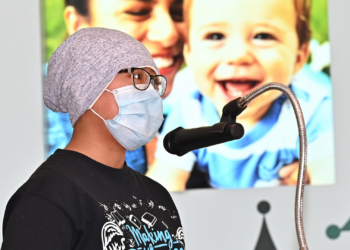Directed by Academy Award-nominee, Kahane Cooperman, and six-time Emmy winner, John Hoffman, THE ANTIDOTE is a documentary that aims to drive a national conversation about the roles that kindness, decency, compassion, and respect play in a civilized, democratic society. In these difficult times, THE ANTIDOTE makes a compelling statement about how important it is for us to come together in communities and give each other a helping hand.
We caught up with Cooperman and Hoffman to discuss the role that kindness plays in their lives, and how their perceptions of kindness developed throughout the making of their film.
Be Kind & Co: Hi Kahane and John! It’s so nice to speak with you both. In your documentary, “The Antidote,” you focus a lot on kindness and its uses, but we are wondering how you made it into such a compelling, realistic portrayal of life. Kindness sometimes gets a bad rap as something of a weakness, but it’s really one of the greatest tools we have. How did you reckon with that?
John Hoffman: Kahane and I made this film that was about one word – kindness – and we had no obligations beyond making the film that we wanted to make. We also had total editorial control and so we found that very daunting. We thought “Where do you start?” I think Kahane can speak to the very concerns that you articulate because she was compelled to want to do something like this, but she heard the same cautions that you talk about in terms of how kindness is perceived.
Kahane Cooperman: So, yes. This was a crucial element. One of our challenges is that if we made a film and anyone responded, “Oh, isn’t that sweet,” we had done something wrong. It was really important out of the gate, though, to fight against that, that thought of people thinking that kindness is really “soft.” Because I don’t see it that way. Even before making this film, I actually see it as a fierce tool for change, and for the way we treat each other, and that it can actually be really effective and moving the needle on so many things. So we knew we all wanted to fight against that.
We read everything and went down every rabbit hole on the internet. We reached out to experts and authorities in like every field, you know, everything from evolutionary science, to philosophy, to religion, to the economy, to science, political science, empathy, compassion, and all that, just everything you could think of. And it was all totally fascinating, and our brains were getting full.
So we kind of brainstormed, like, what are important questions? They are actually really simple.
- How do we raise our children?
- How do we teach our children?
- How do we live and work together?
- How do we treat the sick and the dying?
- How do we welcome the stranger?
- How do we lead?
We felt like if we could start to look for stories, that not with a one on one correlation to the questions, but –stories that on their own touched on these questions, we would have a chance at representing sort of the common breath of a human lifespan, things that almost everyone can relate to. A majority of these questions they would have experienced within their lives. But then, something happened in the news that significantly colored the way we were going to search for these stories.
John: What happened was Charlottesville, and it was a huge sort of glass of cold water in the country’s face. And it was such a stark reminder that there are forces of hate in this country that are as alive today as they’ve been in other eras. As filmmakers, we wanted to telegraph this to the audience.
Charlottesville, it really made us stop and say like, “What? Who are we as a country? Where are these fundamental unkindnesses that shape our culture coming from?” We came up with this list of unkindnesses, which are:
- It is fundamentally unkind to not have a safe place to sleep.
- It is fundamentally unkind to not have access to health care
- It is fundamentally unkind and not be paid a living wage.
- And it’s fundamentally unkind to be subjected to racism, sexism, and homophobia.
Be Kind & Co.: In a lot of ways, kindness is providing others with the support and resources that they need. And I think what your film highlights is that not everyone has those resources, and helping them in material ways is so important.
Kahane: Intentionality is everything for us. We absolutely had to acknowledge the unkindnesses through these stories that caused the struggles at hand, and show what people are doing about them. But the other thing is intentionality. We’ve always said, this is not about random acts of kindness – God bless them, they’re great – but kindness is also about intentional, well-thought-out choices that people are making.
Kindness can be leveraging the resources, either within themselves as an individual or their communities, or the organization that they’re a part of, and they’re making a choice. They’re looking at these problems, and they’re like, “This is what I’m gonna do about it.”
John: There’s also an aspiration that we have had for the film for the longest time. When this film is over, we want people to say, “This is who we are. This is who we are!” For a while now, there has been a great divide in the country and it’s going to maybe take generations to quiet some of those forces of hate. Kahane and I fundamentally believe that people are good and we believe that the communities that we live in are good.
THE ANTIDOTE is a feature documentary that weaves together stories of kindness, decency, and the power of community in America. You can learn more about the making of the documentary at theantidotemovie.com, and view the film on Prime Video or rent the movie through your local independent theatre.

















